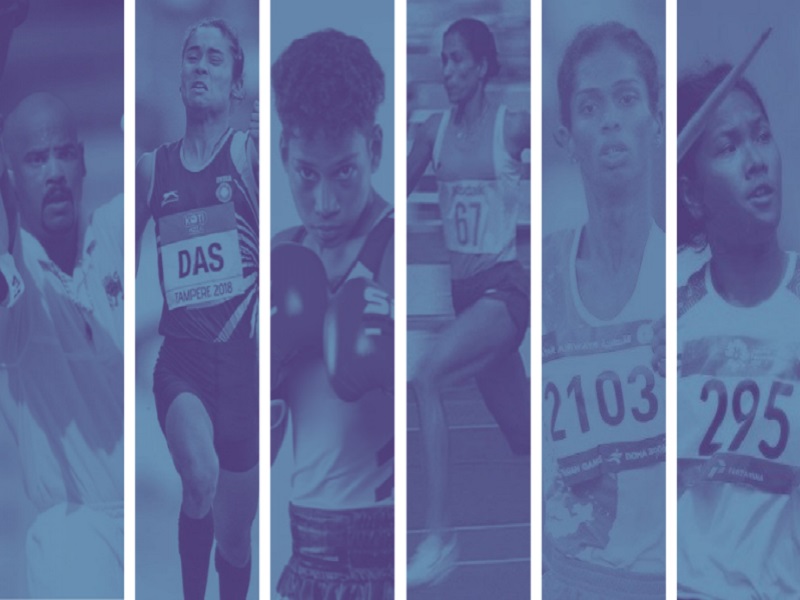In
the Hindu caste system, Dalits are a group of people that belong to the lowest
caste and are characterised as 'untouchables'. Though the caste system has been
dismantled and caste-based discrimination is illegal, it remains deeply
entrenched in India and Nepal, culturally and socially.
This has meant that Dalits continue to be discriminated against on a daily basis - hate crimes against Dalits are common, and segregation in housing, school and access to public services is deep-seated. Dalits also continue to be underrepresented in many higher socioeconomic occupations. Though Dalits are starting to gain prominence and carve a space out for themselves in the arts, there has been very sparse Dalit representation in sport.
April is observed as Dalit History Month, to remember and celebrate important Dalit figures throughout history. To mark this month, we share the stories of six Dalit sportspersons that have excelled in their field and broken many barriers.
Vinod Kambli
India's favourite sport is cricket, and one of the most famous Dalit cricketers is Vinod Kambli, who played for the Indian national cricket team between 1991-2000. Kambli is one of only four Dalit cricketers who has represented the country in test cricket, and is the most well-known Dalit cricketer in Indian cricket history.
A middle order batsman, he played for Boland province in the South African domestic cricket circuit after retiring from the Indian team. He was childhood friends with Sachin Tendulkar, his teammate on the Indian cricket team. Though Kambli does not like to talk about his caste, he has been the victim of caste-based discrimination on the field, especially by disgruntled fans.
Hima Das
Hima Das is an Indian sprinter. She holds the Indian national record over 400 metres, clocking in at 50.79 seconds at the 2018 Asian Games in Jakarta, Indonesia. She is also the first Indian athlete to win a gold medal at a track event at the IAAF World U20 Championships in 2018, where she won the 400-metre sprint.
Das has humble beginnings - the daughter of rice farmers, she hails from a small village in the north-eastern state of Assam. She used to play football in mud fields as a child, but upon the recommendation of her teacher, Shamsul Hoque, she switched to sprint running.
Thulasi Helen
Thulasi Helen is a boxer from Chennai, Tamil Nadu, who has often been referred to as the 'Lady Muhammed Ali of India,' due to her fast footwork and punching style. She won her first gold medal in 2000 at the age of 14, at the 23rd YMCA Boxing Championship in New Delhi. At the height of her career, she defeated Mary Kom (who went on to become an Olympian).
Thulasi had 30 medals to her name when she retired from the sport after she lost the support of the State Boxing Association for speaking up against the sexual harassment she experienced at the hands of the association's secretary. Thulasi has been very outspoken about her Dalit background and the discrimination she has faced because of it. She notes: "Because I was born Dalit, I'm expected to stay at the bottom. But I dream of a different life."
P.T. Usha
P.T. Usha is often referred to as the "queen of track and field" in India. She dominated the Asian scene in track and field events in the 1980s, bagging numerous medals for India. Usha became the first Indian woman to reach an Olympic final in 1984, at the Los Angeles Olympics, where she missed out on the bronze medal in the women's 400-meter hurdles by 1/100th of a second.
She now runs an academy in Kozhikode, Kerala, hoping to nurture a new generation of Indian athletes.
Santhi Soundarajan
One of five children of brick kiln workers in Tamil Nadu, Santhi Soundarajan is a track and field athlete who has won more than 12 international medals for India. She holds the Indian national record for the women's 3000 meters steeplechase.
In 2006, she was stripped of her silver medal in the women's 800-meter race at the Asian Games in Doha, Qatar, after failing a sex verification test. The humiliation she suffered from this unethical and unscientific test caused her to go into a depression, and she survived a suicide attempt. She has since supported other female athletes that have undergone similar cases, including Caster Semenya and Dutee Chand.
Soundarajan has claimed to have experienced caste-based discrimination in her work as a coach with the Sports Authority of India.
Swapna Barman
Daughter of a rickshaw driver and a tea estate worker, Swapna bagged a gold for India in the heptathlon event at the Asian Games in 2018, the first Indian to do so. Swapna is from the eastern Indian state of West Bengal, where her caste, the Koch Rajbanshis, have been routinely ostracised and criminalised in the upper-caste mainstream.
Swapna was born with a congenital anomaly, due to which she has six toes on both feet. However, given her family's poverty, she has never been able to buy special shoes, and has had to compete in normal shoes, which are often constricting.
Moving forward
Dalits continue to be underrepresented in Indian sport. While India's overall sporting culture can be critiqued to be lacking, the chances available for Dalits to partake in sports, especially team sports, remain slim. Cultural, systemic and institutional barriers continue to prevent Dalits from participating in sports, including poverty and caste-based discriminatory practices. Though the idea of a caste-based quota in sports, especially in the Indian men's cricket team, has been debated, it has usually been met with fierce backlash.
Only through concerted and deliberate efforts will Dalit sportspersons get a fair chance at excelling in their fields. Both grassroots sports organisations and elite sports policies should work to ensure that more Dalits can exercise their right to participate in sport and that talent is identified and nurtured so that we can see more Dalit talent in sport in the near future.
Source: Sport and Dev
0 COMMENTS



